从译者的“适应”与“选择”看法律文本英汉翻译——以“WORLD ANTI-DOPING CODE(2015)”为例
中国法律法规英译的问题和解决

英语知识1 导言随着中国对外开放的步伐,尤其是中国加入世界贸易组织,中国法律法规英译成为中国对外法律交流和对外贸易等活动中的重要环节。
鉴于这种情况,我们从中国法律法规英译的现状出发,对目前中国的法律法规英译本进行分析,针对中国法律法规英译的特点和困难以及英译的原则、方法和问题的解决等进行分析、论证,希望能对我国法律法规英译工作具有参考作用。
法律翻译具有与普通翻译明显不同的特点。
从法律翻译的历史看,译者的地位问题一直是讨论的焦点之一。
从单纯的文本转换到交际过程中的翻译(见 ? ar ? evi ? 1997 : 55 ),法律翻译研究的侧重点发生了一系列变化,译者从被动、次要的地位,上升到翻译过程的主要参与者,扮演了重要角色,而且在有多种因素交织的交际过程中,译者的作用不能孤立地看待。
? ar ? evi ? ( 1997 : 3 )在 New approach to Legal Translation 的前言部分明确地提出:首先,通过建立译者在其中承担法律交际中积极参与者角色的一个理论框架, [ 本研究 ] 试图提供法律翻译的一种新方法。
传统上,一直否认法律翻译者应具有决策自由。
现在,由于持不同意见者大胆藐视传统,法律翻译者终于获得了新的责任和决策权威。
……因此,法律翻译在本研究中被看作一种交际行为。
[a]? ar ? evi ? 的观点可以说是‘法律翻译交际论’的集中体现。
? ar ? evi ? ( 1997 : 60 )认为“立法过程的法律交流主要发生于两大组专家之间:制定法律的人(政策制定者、法律起草者、立法人员)和适用法律的人(律师、管理人员、法官)。
”[b] 第一组人员是法律文本的作者,第二组专家是法律文本的直接接受者,根据法律内容的不同,直接接受者还可包括其他人。
法律内容所涉及的人员如犯罪者等,则属于间接接受者,他们可能要通过律师解读法律,适用法律。
? ar ? evi ? 认为,虽然国际公约规定每一真实文本的对应术语都应有相同的意义,但实际上很难做到。
解析汉英翻译——谈法律文献汉译英的理解与表达问题
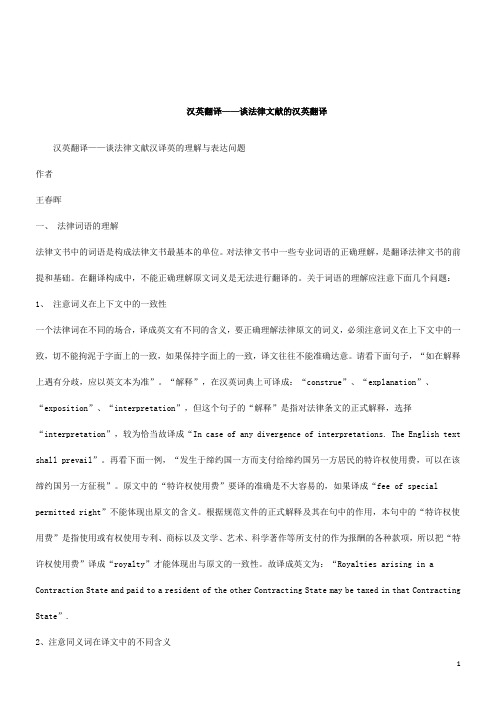
汉英翻译——谈法律文献的汉英翻译汉英翻译——谈法律文献汉译英的理解与表达问题作者王春晖一、法律词语的理解法律文书中的词语是构成法律文书最基本的单位。
对法律文书中一些专业词语的正确理解,是翻译法律文书的前提和基础。
在翻译构成中,不能正确理解原文词义是无法进行翻译的。
关于词语的理解应注意下面几个问题:1、注意词义在上下文中的一致性一个法律词在不同的场合,译成英文有不同的含义,要正确理解法律原文的词义,必须注意词义在上下文中的一致,切不能拘泥于字面上的一致,如果保持字面上的一致,译文往往不能准确达意。
请看下面句子,“如在解释上遇有分歧,应以英文本为准”。
“解释”,在汉英词典上可译成:“construe”、“explanation”、“exposition”、“interpretation”,但这个句子的“解释”是指对法律条文的正式解释,选择“interpretation”,较为恰当故译成“In case of any divergence of interpretations. The English text shall prevail”。
再看下面一例,“发生于缔约国一方而支付给缔约国另一方居民的特许权使用费,可以在该缔约国另一方征税”。
原文中的“特许权使用费”要译的准确是不大容易的,如果译成“fee of special permitted right”不能体现出原文的含义。
根据规范文件的正式解释及其在句中的作用,本句中的“特许权使用费”是指使用或有权使用专利、商标以及文学、艺术、科学著作等所支付的作为报酬的各种款项,所以把“特许权使用费”译成“royalty”才能体现出与原文的一致性。
故译成英文为:“Royalties arising in a Contraction State and paid to a resident of the other Contracting State may be taxed in that Contracting State”.2、注意同义词在译文中的不同含义在进行法律文书汉译英翻译过程中,有时会碰到不少汉语意义相同的词,但这些词在不同的搭配中和特定的上下文中,是有明显区别的,译者一定要注意语言的逻辑性,勤查专业工具书。
法律文本翻译第十二章 常用法律文本翻译示例

法律文本翻译第十二章 常用法律文本翻译示例
CONTENTS
教学 目 标 背景知识 本章知识 剖析
补充材料
TEACHING AIMS 教学目标 • 学习本章之后,需掌握以下知识点:
• 1.对法律文本的类型有所了解 • 2.能够对法律文本正误译进行一定分析 • 3.能对法律文本的误议
• 第一章 基本原则 第一条 为了保障公民、法人的合法的民事权益,正确调整民事关系, 适应社会主义现代化建设事业发展的需要,根据宪法和我国实际情况, 总结民事活动的实践经验,制定本法。 第二条 中华人民共和国民法调整平等主体的公民之间、法人之间、公 民和法人之间的财产关系和人身关系。 第三条 当事人在民事活动中的地位平等。 第四条 民事活动应当遵循自愿、公平、等价有偿、诚实信用的原则。 第五条 公民、法人的合法的民事权益受法律保护,任何组织和个人不 得侵犯。 第六条 民事活动必须遵守法律,法律没有规定的,应当遵守国家政策。 第七条 民事活动应当尊重社会公德,不得损害社会公共利益,破坏国 家经济计划,扰乱社会经济秩序。 第八条 在中华人民共和国领域内的民事活动,适用中华人民共和国法 律,法律另有规定的除外。 本法关于公民的规定,适用于在中华人民共和国领域内的外国人、无 国籍人,法律另有规定的除外。
翻译适应选择论视角下的汉语公示语英译
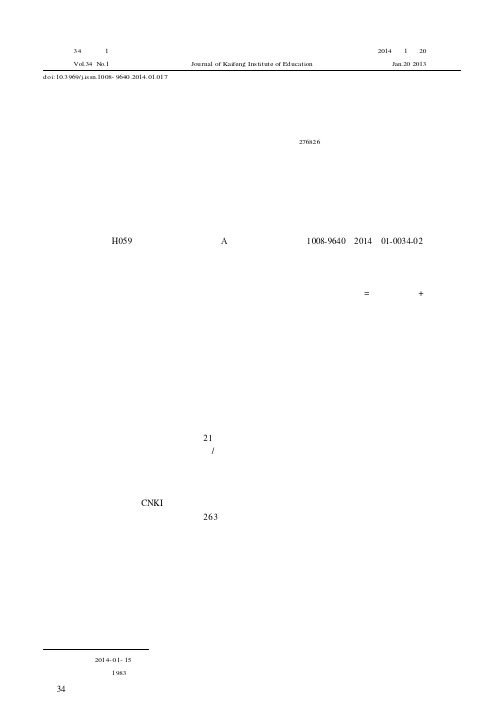
第34卷第1期Vol.34N o.1开封教育学院学报Journal of Kaifeng Institute of Education2014年1月20日Jan.20201334doi:10.3969/j.issn.1008-9640.2014.01.017公示语是公众在公共场合所看的文字语言及图形信息,涉及生活的各个方面。
公示语具有指示性、提示性、限制性、强制性四种主要应用功能,而且具有规范性、标准性、系统性、承继性等主要特点,其英译效果对于提升我国的国际形象,促进我国的对外交往和经济合作具有十分重要的意义。
因此,要求译者在进行公示语翻译时,应该正确了解该公示语的应用功能及其翻译标准。
由于汉英两种语言本身存在差异,再加上原语与目的语读者思维习惯、文化观念以及审美上的差异,导致公示语的翻译存在很多问题,如错误翻译、死解原文、措辞不当等。
因此,公示语的翻译成为日益关注的研究对象。
一、翻译适应选择论对公示语翻译应用的可行性翻译适应选择论由胡庚申教授于21世纪提出。
胡教授指出,该理论以达尔文“适应/选择”学说的基本原理和思想为指导,以“翻译即适应与选择”的主题概念为基调,以“译者为中心”的翻译理念为核心,是能够对翻译本体做出新解的翻译理论范式。
通过检索CNKI 中国期刊网,以“公示语翻译”为关键词进行检索,大约有263条,大多从目的论、交际理论、功能对等以及语用关联理论等视角进行探索。
而从翻译适应选择论的视角研究公示语的还是凤毛麟角,而且在核心刊物也并不多见,这也可以从另一侧面说明本课题具有很大空间值得研究。
从“适应”与“选择”的视角解读翻译过程,翻译就是译者的适应与译者的选择。
借用“生命体”接受“自然选择”的基本原理和思想,将翻译定义为“译者适应翻译生态环境的选择活动”。
而“翻译生态环境”指的是原文、原语和译语所呈现的世界,即语言、交际、文化、社会,以及作者、读者、委托者等互联互动的整体。
简化地说,翻译=译者的适应+译者的选择。
法律文本翻译讲义
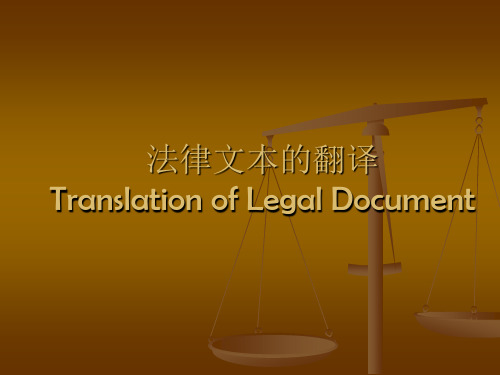
Functions of legal document
法律文本的功能 法律文本的主要功能应当是呼吁、规范, 提供信息只能是它的各种次要功能之一、 法律文本具有规定、约束性功能以规范和 指导社会与个人之间、个人与个人之间在 政治、经济和文化等领域的活动和行为, 其规范功能受到国家强制力的保护,具有 强制性。
法律文本的翻译 Translation of Legal Document
It is not possible to gain an insight into the nature of any institution of human life without an inquiry into the purposes or functions which the particular institution is designed to accomplish. Nobody can intelligently discuss problems of government and arrive at a considered judgment with respect to the policies which should be promoted by public officials or agencies without first forming an opinion as to the general aims and ends for which governments are established. This is equally true for the institution of law, at least in the secular, political sense with which we are concerned. We treat law as a particular kind of governmental institution. From this perspective, we assert that no official within the institution of law—no judge, attorney or other person with official duties in the administration of law—can adequately discharge his or her duties unless familiar with the general purposes which the law is supposed to perform for society.
国际法律中英文对照外文翻译文献
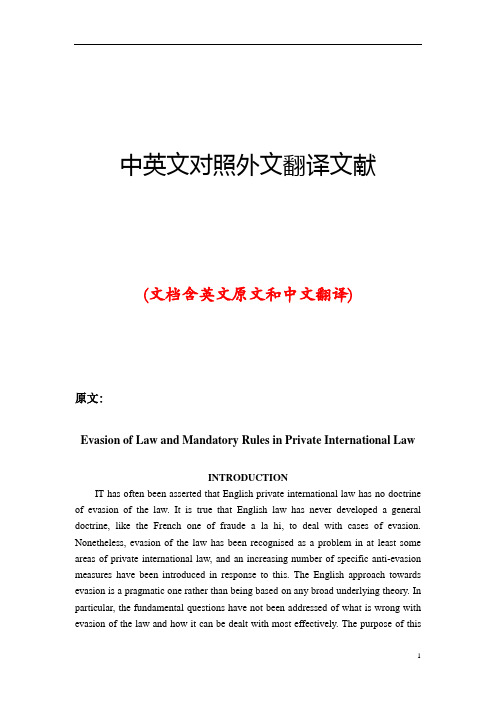
中英文对照外文翻译文献(文档含英文原文和中文翻译)原文:Evasion of Law and Mandatory Rules in Private International LawINTRODUCTIONIT has often been asserted that English private international law has no doctrine of evasion of the law. It is true that English law has never developed a general doctrine, like the French one of fraude a la hi, to deal with cases of evasion. Nonetheless, evasion of the law has been recognised as a problem in at least some areas of private international law, and an increasing number of specific anti-evasion measures have been introduced in response to this. The English approach towards evasion is a pragmatic one rather than being based on any broad underlying theory. In particular, the fundamental questions have not been addressed of what is wrong with evasion of the law and how it can be dealt with most effectively. The purpose of thisarticle is to examine the present law on evasion, determine what is wrong with evasion of the law and put forward proposals for a principled approach to deal with the problem.I THE PRESENT LAW ON EV ASIONThe most obvious sense in which the law is evaded is when persons deliberately flout the law, for example a taxpayer fails to declare all his income to the Inland Revenue, or a person smuggles goods into a country in breach of import controls. In such cases the party seeking to evade the law wishes no law to apply. The private international lawyer may be concerned with this type of case, for instance the English courts may be asked to enforce a contract the performance of which involves the illegal export of goods.Of more interest to the private international lawyer, and the subject of this article, are those cases where laws are evaded by persons showing a preference for the application of one country's law rather than that of another. People can show this preference by going to another country in the expectation that that country's law will be applied to their affairs. This has happened in the sphere of family law where evasive marriages, divorces and abduction of children are well known. Evasion can also take place in the commercial sphere where the particular method of evasion takes a different form, i.e. contractual agreements that a particular law will apply. Those areas in which evasion has been recognised as being a problem: marriage, divorce, child abduction and custody, and contract, will now be examined in detail, after which some conclusions will be drawn on the nature of the approach towards evasion adopted under the present law.A. Evasive MarriagesEvasive marriages have been a well known phenomenon since the earliest days of conflict of laws. Starting with Brook v. Brook in the middle of the nineteenth century there has been a spate of reported cases involving English couples going to Denmark or Germany to marry in order to evade the English law on the prohibited degrees of marriage. After the marriage the couple would return to live in England. The English courts strongly objected to the attempt to evade English law in these cases and refused to recognise the foreign marriage. The technique for dealing with the evasion was to classify the issue in the case as being one of essential validity and to apply the law of the domicile of the parties, England, to the question of the validity of the foreign marriage. In other words, the courts moulded their private international rule on capacity to enter a marriage to stop evasion of the law. The gradual relaxationin the prohibited degrees under English law has largely meant the end of such instances of evasion. However, it still remains the case that, for example, an uncle will be unable to marry his niece in England but he may be able to do so under some foreign systems of law.Better known to laymen than the Danish marriages cases are the Gretna Green marriage cases.At one time young English couples would elope to Scotland in order to evade the English requirement of parental consent for the marriage of a child between the ages of 16 and 21. Such a child could marry in Scotland without parental consent, there being very much less formality for marriage under Scots law. The reduction of the age of majority to 18 in England has meant that in most cases there is no longer any need for young couples to go to Scotland to enter into a valid marriage. However, the attitude of the English courts towards Gretna Green marriages is instructive and contrasts strongly with their attitude towards the Danish marriages. No objection was made to the parties evading the English requirement of parental consent by going to marry in Scotland and these Scots marriages were recognised as being valid. The issue was classified as one of formal validity and the law of the place of celebration was applied to the marriage, i.e. Scots law. The private international law rule was not moulded to stop evasion.The traffic in evasive marriage was not all one way. There are well known instances of French couples coming to England in order to evade stringent French requirements of parental consent to the marriage of children up to the age of 25. Not surprisingly, in the light of the Gretna Green marriages, these English marriages were regarded as being valid, despite the clear evasion of French law by the parties.B. Evasive DivorcesIn 1868 in Shaw v. Gould Lord Westbury, speaking in the context of a Scots divorce obtained by an English domiciliary said that:No nation can be required to admit that its domiciled subjects may lawfully resort to another country for the purpose of evading the laws under which they live. When they return to the country of their domicile, bringing back with them a foreign judgment so obtained, the tribunals of the domicile are entitled or even bound, to reject such judgment, as having no extra-territorial force or validity.A hundred years later there was considerable judicial concern that, whilst the rules on recognition of foreign divorces should be liberalised and made more flexible, "quickie" divorces obtained abroad after a short period of residence should not be recognised. The technique for achieving this was to introduce at common law a realand substantial connection test as a basis for the recognition of foreign divorces. A petitioner who was merely temporarily in, for example, Nevada when he obtained his divorce, would not be able to satisfy this test and the foreign divorce would not be recognised. The attitude subsequently changed and the Recognition of Divorces and Legal Separations Act 1971 enshrined the Law Commission's philosophy that, if there had been forum shopping, the harm had already been done, and in order to prevent a limping marriage the foreign divorce should still be recognised in England.This still remains the general view to this day. However, there are two specific statutory anti-evasion provisions which constitute exceptions to this general rule. Both provisions are concerned with extra-judicial divorces. There was a concern shown by the judiciary and then by Parliament that parties should not be able to evade the English system of divorces granted by courts and the English law on financial provision on divorce by obtaining in England an extrajudicial divorce. Since 1974 such extra-judicial divorces have therefore been denied recognition. There was then a concern that the particular statutory provision denying recognition to this type of divorce could itself be evaded by English residents going abroad, for example on a day trip to France, to obtain an extra-judicial divorce which, because it would be recognised in their foreign domicile, would be recognised in England. The latest version of the relevant statutory anti-evasion provision seeks to prevent this by denying recognition to extra-judicial divorces obtained, without proceedings, outside the British Islands if either spouse had for a period of one year immediately preceding the institution of the proceedings habitually been resident in the United Kingdom. The latter provision does nothing to prevent an English domiciliary from evading his financial responsibilities to his spouse by obtaining an extra-judicial divorce in the state of his nationality, and then having this recognised in England. However, the Court of Appeal in Chaudhary v. Chaudhary held that, in such circumstances, recognition of the divorce would be contrary to public policy, thereby preventing the evasion.C. Child Abduction and CustodyThe most recent problem of evasion to arise in the family law area involves cases of child abduction and custody. If the parents of a child are in dispute over the custody of a child and the parent who has not been granted custody by the English courts seizes the child and removes it abroad, there is a deliberate flouting of the English law in that the English custody order has been disregarded. This is regarded as a very serious matter and Parliament has intervened to introduce new criminal offencesconcerned with taking a child under the age of 16 out of the jurisdiction without consent. There may also be an element of the errant parent preferring the application of a foreign law in that this parent may seek and obtain a custody order abroad. The problem is essentially one of getting a foreign court to recognise the English custody order or the custody rights (if no order has been made) and return the child to England. There are now international conventions on child abduction and custody, and if the child is removed to a country which is a party to these conventions, that country may be obliged to recognise the English custody order and rights. As far as the United Kingdom is concerned the international conventions were brought into effect by the Child Abduction and Custody Act 1985, which requires English courts to recognise foreign custody orders and rights in certain circumstances.D. Evasive ContractsIn contract cases the judiciary appear on the face of it to have a strong objection to evasion of the law. In theory the requirement laid down in Vita Food Products v. Unus Shipping that the parties' choice of the applicable law must be made in good faith, will stop all cases of evasion of the law. Even if the case involves an issue of formal validity of the contract the bona fides doctrine can still come into play. This contrasts with marriage cases where, as has been seen, the evasion of formal requirements is not objected to. However, in practice the requirement of a bona fide choice does not appear to restrict the parties' freedom to choose the applicable law. There is no reported English case in which the parties' choice has been struck out on this ground. It is important to notice that, although the Vita Foods Case introduced a restriction on party autonomy, this restriction did not apply on the facts of the case and the result was to allow parties to evade the Hague Rules.Much more important than the common law doctrine of bona fides are the specific statutory anti-evasion provisions that have been introduced into the area of contract. The most famous of these is contained in section 27 of the Unfair Contract Terms Act 1977. This section prevents evasion of English law, or the law of any other part of the United Kingdom, by restricting the parties' freedom to choose a foreign law. It provides that the Act and the protection it gives to consumers still has effect if the choice of law appears "to have been imposed wholly or mainly for the purpose of enabling the party imposing it to evade the operation of this Act". The section goes on to provide as an alternative that the Act will apply, despite the parties' choice, if "in the making of the contract one of the parties dealt as consumer, and he was then habitually resident in the United Kingdom, and the essential steps necessary for themaking of the contract were taken there, whether by him or by others on his behalf". The section, more controversially, also prevents parties from evading foreign law. It restricts the right of parties, whose contract has a foreign objective proper law, to choose the law of part of the United Kingdom by providing that, in such a case, certain sections of the Act will not apply as part of the proper law.Another example of a statutory anti-evasion provision is to be found in the Carriage of Goods by Sea Act 1971, implementing the Hague-Visby Rules. Under the old Hague Rules there was a problem of people evading those Rules by the insertion of a choice of law clause in their contract. This gap was closed by the insertion in the Hague-Visby Rules of a new Article X to replace the original Article X in the Hague Rules. This lays down the territorial scope of the new Rules, and is coupled with a provision in the implementing legislation which states that the Rules, as set out in the Schedule to the Carriage of Goods by Sea Act 1971, shall have the force of law. According to the House of Lords in The Hollandia the intention of Parliament was for the new Rules to apply whenever the case comes within Article X, regardless of whether there is a foreign proper law. Their Lordships were concerned to interpret the Act and the Hague-Visby Rules in such a way as to prevent the possibility of their being evaded. As Lord Diplock said:[the Hague-Visby Rules]should be given a purposive rather than a narrow literalistic construction, particularly wherever the adoption of a literalist construction would enable the stated purpose of the international convention, viz., the unification of domestic laws of the contracting states relating to bills of lading, to be evaded by the use of colourable devices that, not being expressly referred to in the rules, are not specifically prohibited.An Ad Hoc ApproachWhat is noticeable about the present law on evasion is that no general principle has been developed to explain why evasion is regarded as objectionable in some cases but not in others. The law seems quite inconsistent, with evasive Gretna Green marriages being regarded as perfectly acceptable but evasive Danish marriages being regarded as beyond the pale. The whole approach towards evasion is essentially an ad hoc one; not only are different types of evasive marriage treated differently, but also evasive marriages are treated in isolation from evasive divorces or evasive contracts. This ad hoc approach extends to the technique for dealing with those cases where evasion is regarded as objectionable. In some cases specific statutory anti-evasionprovisions have been adopted to deal with evasion; in other cases the technique has been to mould common law rules to deal with the problem. The result is that the present law on evasion can be seen to be unduly complex, uncertain and inconsistent.A more principled approach is needed but before this can be developed an answer is required to the fundamental question, which so far has been ignored under English law: what is wrong with evasion of the law?II WHAT IS WRONG WITH EV ASION OF THE LAW?A. Moral GuiltThe term evasion is a loaded one, with connotations of shifty, underhand behaviour. It is easy to fall into the trap of automatically assuming that a desire to evade the law is in itself morally reprehensible. This is what has happened in the area of contract choice of law. The requirement that the choice of the applicable law must be made in good faith concentrates on the motives of the parties, and if these are impure the choice is necessarily regarded as a bad one and to be struck out. Yet there is nothing wrong in principle with parties choosing the law to govern their transactions. Indeed, it is very desirable that they should make such a choice. Party autonomy produces certainty in the law and upholds the expectations of the parties. In some cases this choice may be made on the basis that the application of one law is more convenient than that of another. In other cases the choice may be made on the basis that the content of one law is preferred by the parties to that of another. For example, the parties to an international insurance or shipping contract may choose the law of England to apply, despite the fact that there is no connection with this country, because they regard English law as being well developed in this area. No one would stigmatise this type of conduct. Is it any worse if the parties choose a law to apply because they prefer some specific provisions of that law to that of some other country? What the parties are usually trying to do in such a case is to ensure that a law is applied which provides that their transaction, whether it is a commercial contract or a marriage, is valid. This should not be a cause for concern, nor should it be condemned on the mistaken basis that the parties' motives are impure. Moreover, there is something slightly hypocritical in the judiciary making this type of moral judgment when they themselves are quite prepared to escape from applying a law the content of which is not to their liking by using such devices as public policy and renvoi.Whilst there is nothing wrong with the parties' motives in cases of evasion, this does not mean that the practice is unobjectionable. In some cases the evasion mayinvolve unfairness to someone else; the evasion may even be against the national interest.译文:国际私法中的法律规避和强制性规则引言人们常常说,英国的国际私法学说中没有法律规避原则。
顺应理论对法律文本翻译研究的启示

顺应理论对法律文本翻译研究的启示法律文本翻译是一项具有重要意义和挑战性的工作。
在全球化的背景下,法律交流日益频繁,准确、恰当的法律文本翻译对于促进国际法律合作、保障当事人的合法权益以及维护法律秩序的稳定至关重要。
顺应理论作为一种语用学理论,为法律文本翻译研究提供了新的视角和有益的启示。
一、顺应理论概述顺应理论由比利时语言学家耶夫·维索尔伦(Jef Verschueren)提出,该理论认为语言的使用是一个不断选择的过程,语言使用者根据交际目的和语境因素,在语言的各个层面(语音、词汇、语法、语义等)做出灵活的选择,以实现交际的成功。
这种选择是动态的、顺应的,既要顺应语言使用者的物理世界、社交世界和心理世界,也要顺应语言结构本身的特点。
二、法律文本的特点法律文本具有准确性、权威性、规范性和专业性等特点。
准确性是法律文本的首要要求,任何模糊或歧义都可能导致法律适用的偏差。
法律语言往往使用精确的术语和定义,以确保法律概念的清晰表达。
权威性体现在法律文本是由具有立法权的机构制定,具有强制力和约束力。
规范性表现为法律文本遵循特定的格式和结构,有明确的篇章布局和语言表达方式。
专业性则反映在大量使用法律术语、行话和特定的句法结构上。
三、顺应理论在法律文本翻译中的应用1、对语言结构的顺应在词汇层面,法律术语的翻译需要准确顺应源语和目标语的语言结构。
例如,“burglary”在法律语境中通常翻译为“入室盗窃”,而不能简单地译为“盗窃”。
在句法层面,法律文本中常见的长句、复杂句结构在翻译时需要根据目标语的语法规则进行调整,以保持句子的逻辑清晰和表达准确。
2、对物理世界的顺应物理世界包括时间、空间等因素。
在法律文本翻译中,需要考虑不同国家和地区的法律体系、法律文化以及法律实践的差异。
例如,某些法律概念在不同的法律体系中可能有不同的定义和适用范围,翻译时需要根据具体的法律环境进行顺应。
3、对社交世界的顺应社交世界涵盖了社会规范、文化习俗、政治制度等方面。
《法律解释视域下的法律文本汉译英研究》读书笔记思维导图

第五章 法律解释与译文的等效表 达
第二节 法律等效表 达上的亏欠
第一节 译文表达的 法律等效
第三节 法律等效表 达规则与方法
第六章 法律解释与目标语言的达 意验真
第一节 传统翻译验 证审视
第二节 法律解释于 翻译验证之必要
第三节 法律解释于 翻译验证之可能
第四节 法律解释下 的达意验真方略
第七章 结论与展望
06
第三章 法律文的真意探究
08
第五章 法律解释与译 文的等效表达
09 第六章 法律解释与目 标语言的达意验真
010 第七章 结论与展望
011 参考文献
012 后记
本书以“法律解释”为视角和理论基准,从法律文本汉译英失真现象剖析出发,以“问题”为导向,以理论 构建讨论为重心,以原则、标准与方法提炼为依归,着眼于法律文本汉译英的三大关键环节:原文的理解、译文 的表达和达意的验证,回归法律文本汉译英失真问题的解决。本书对法律解释理论在法律文本汉译英中的运用问 题进行了系统性补白研究,提炼了基于法律解释理论的法律文本汉译英方略,迥异于传统语言理论和翻译理论的 研究视野,是探索性的法学与语言学交叉学科研究绪论
第二节 研究现状
第一节 课题研究缘 起
第三节 研究设计
第二章 法律解释视域下的法律翻 译命题
第一节 法律翻译中 的法律解释价值
第二节 法律解释下 的法律翻译过程
第三节 法律解释下 的法律翻译范畴
第四节 法律解释下 的法律翻译原则
第三章 法律文本英译实证剖析
第一节 法律英译的 首要标准:准确不失
真
第二节 法律英译主 要环节的失真检视
第三节 非法律解释 视角下的失真类型与 成因
第四节 法律解释视 角下的失真类型与成 因
翻译适应选择论视角下的对外宣传材料汉英翻译研究
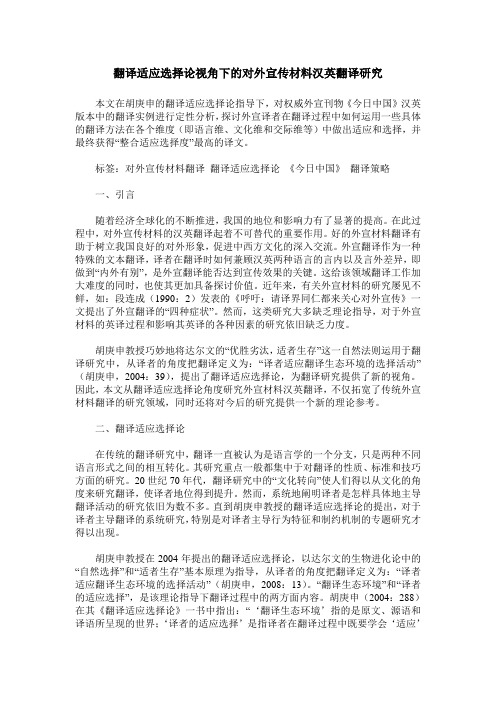
翻译适应选择论视角下的对外宣传材料汉英翻译研究本文在胡庚申的翻译适应选择论指导下,对权威外宣刊物《今日中国》汉英版本中的翻译实例进行定性分析,探讨外宣译者在翻译过程中如何运用一些具体的翻译方法在各个维度(即语言维、文化维和交际维等)中做出适应和选择,并最终获得“整合适应选择度”最高的译文。
标签:对外宣传材料翻译翻译适应选择论《今日中国》翻译策略一、引言随着经济全球化的不断推进,我国的地位和影响力有了显著的提高。
在此过程中,对外宣传材料的汉英翻译起着不可替代的重要作用。
好的外宣材料翻译有助于树立我国良好的对外形象,促进中西方文化的深入交流。
外宣翻译作为一种特殊的文本翻译,译者在翻译时如何兼顾汉英两种语言的言内以及言外差异,即做到“内外有别”,是外宣翻译能否达到宣传效果的关键。
这给该领域翻译工作加大难度的同时,也使其更加具备探讨价值。
近年来,有关外宣材料的研究屡见不鲜,如:段连成(1990:2)发表的《呼吁:请译界同仁都来关心对外宣传》一文提出了外宣翻译的“四种症状”。
然而,这类研究大多缺乏理论指导,对于外宣材料的英译过程和影响其英译的各种因素的研究依旧缺乏力度。
胡庚申教授巧妙地将达尔文的“优胜劣汰,适者生存”这一自然法则运用于翻译研究中,从译者的角度把翻译定义为:“译者适应翻译生态环境的选择活动”(胡庚申,2004:39),提出了翻译适应选择论,为翻译研究提供了新的视角。
因此,本文从翻译适应选择论角度研究外宣材料汉英翻译,不仅拓宽了传统外宣材料翻译的研究领域,同时还将对今后的研究提供一个新的理论参考。
二、翻译适应选择论在传统的翻译研究中,翻译一直被认为是语言学的一个分支,只是两种不同语言形式之间的相互转化。
其研究重点一般都集中于对翻译的性质、标准和技巧方面的研究。
20世纪70年代,翻译研究中的“文化转向”使人们得以从文化的角度来研究翻译,使译者地位得到提升。
然而,系统地阐明译者是怎样具体地主导翻译活动的研究依旧为数不多。
译者的适应与选择:外宣翻译过程研究
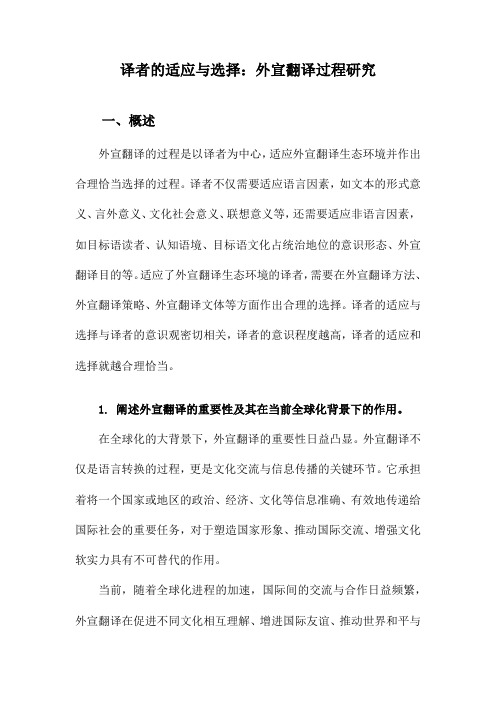
译者的适应与选择:外宣翻译过程研究一、概述外宣翻译的过程是以译者为中心,适应外宣翻译生态环境并作出合理恰当选择的过程。
译者不仅需要适应语言因素,如文本的形式意义、言外意义、文化社会意义、联想意义等,还需要适应非语言因素,如目标语读者、认知语境、目标语文化占统治地位的意识形态、外宣翻译目的等。
适应了外宣翻译生态环境的译者,需要在外宣翻译方法、外宣翻译策略、外宣翻译文体等方面作出合理的选择。
译者的适应与选择与译者的意识观密切相关,译者的意识程度越高,译者的适应和选择就越合理恰当。
1. 阐述外宣翻译的重要性及其在当前全球化背景下的作用。
在全球化的大背景下,外宣翻译的重要性日益凸显。
外宣翻译不仅是语言转换的过程,更是文化交流与信息传播的关键环节。
它承担着将一个国家或地区的政治、经济、文化等信息准确、有效地传递给国际社会的重要任务,对于塑造国家形象、推动国际交流、增强文化软实力具有不可替代的作用。
当前,随着全球化进程的加速,国际间的交流与合作日益频繁,外宣翻译在促进不同文化相互理解、增进国际友谊、推动世界和平与发展等方面发挥着越来越重要的作用。
特别是在新媒体时代,信息传播的速度和广度前所未有,外宣翻译的质量和效率直接关系到国家形象的塑造和国际话语权的掌握。
深入研究外宣翻译的过程和机制,探讨译者在翻译过程中的适应与选择策略,对于提高外宣翻译的质量、增强国家文化的国际影响力具有重要意义。
这不仅有助于我们更好地理解和应对全球化带来的挑战和机遇,也能为构建人类命运共同体贡献智慧和力量。
2. 提出研究外宣翻译过程中译者适应与选择的重要性。
在全球化日益盛行的当下,外宣翻译的作用显得越来越重要。
它不仅是一种语言转换的艺术,更是一种文化交流和理解的桥梁。
深入研究外宣翻译过程中的译者适应与选择具有极其重要的意义。
译者的适应与选择直接关系到外宣翻译的质量和效果。
译者需要在深入理解源语言文化的基础上,灵活适应目标语言文化的特点,进行恰当的语言转换。
法律合同文本的英译及其语用分析

- 246-校园英语 / 翻译研究法律合同文本的英译及其语用分析大连大学/马梦瑶【摘要】作为正式程度非常高的一种文本,法律文本有其独特的特点。
本文从语用的角度出发,分析法律文本中一些词语和句型常见的翻译方法,研究发现只有充分掌握法律知识和文化,才能使法律翻译更加专业化。
【关键词】法律合同 英译 语用分析一、引言近年来,随着经济、政治和文化的交流越来越频繁,法律文本翻译的研究变得非常重要。
Mary Snell-Hornby提出文本翻译的范畴化,可以将文本划分为不同的类型,法律文本则属于特殊用途文本(1995),与普通文本的翻译不同的是,译者翻译法律文本时,要弄清法律语言的规律和特点,使译文读者能够清楚自己的法律权利和义务,避免对当事人造成经济损失。
本文以某公司的国际商务合同为例,从语用的角度出发,总结其词汇和句型的特点,探究它们的英译方法。
二、法律文本的词汇和句型的特点在法律中,常见的旧体词的使用频率很高,如“兹、至此、herein、thereof”等,这些词给人一种庄重感;一些普通词语在法律文件中被赋予了特殊的意义,如“retain”的普通意义是“保持,持有,容纳”,而在美国颁布的权威《布莱克法律词典》里的解释是聘请处理法律事务的律师或者顾问。
此外,还有一些句型在法律文本中反复使用,比如“以……为条件”常与法律文件中特定条款名配合使用,那么从语用的角度来讲,每个条件都要顾及到各种可能发生的情况,因此在英译合同文本时,尽可能保留句式和用词的严谨。
三、法律文件中词语和固定句型的英译及语用分析首先,译者须了解旧体词的具体含义,而且学会识别和使用含有法律意义的普通词语。
此外,一些典型句型对应的英译方法基本固定,因此译者要进行准确的翻译,使译文体现出法律英语专业性。
例1:A方负责提供资金、厂房、设备、融资渠道及销售网络。
译文:Party A shall be liable for providing capital,plant,equipment,financing channels and sales network.例2:合资公司的法律文件和其它内容的文件不得单方面向任何它方泄露和提供。
法律文件的翻译要求和标准

法律文件的翻译要求和标准在国际交流与合作不断增加的今天,法律文件的翻译需求日益突出。
准确且符合专业标准的法律文件翻译是确保国际合作的必要条件。
本文将介绍法律文件翻译的要求和标准,提供一些有效的指导原则。
一、法律文件翻译要求1. 准确性法律文件的翻译首要要求是准确传达原文的含义。
准确性是保障翻译结果符合法律要求的基本前提。
翻译者应深入理解源语言和目标语言的法律概念和术语,确保在翻译过程中保持一致性。
只有准确地传递法律文件的内容,才能保证文件双方在法律层面达成一致。
2. 专业性法律文件属于专业性极高的文本,翻译人员需要具备扎实的法律知识和丰富的翻译经验。
他们应熟悉法律术语,并了解法律制度和体系。
专业的翻译人员能够更准确地理解法律文本的内涵,将其转化为目标语文本。
翻译人员应时刻关注法律的变化,更新自己的专业知识。
3. 表达力法律文件的表达应该准确、简明扼要。
翻译人员需要根据原文的特点,使用目标语言的表达方式和习惯用语,传达相同的法律观念并保持文本的风格稳定。
避免使用过于复杂的文句结构或过多的修饰词,使得翻译结果更加简洁明了。
二、法律文件翻译标准1. 一致性法律文件的翻译应与原文保持一致性,准确地传达每个细节和要素。
在整个翻译过程中,应避免意译,尽可能地对原文做到逐字逐句的翻译。
特定的法律术语和表达方式应在合适的情况下进行标准化处理,确保翻译结果与原文的精准对应。
2. 可读性法律文件的翻译需要保持可读性,既要满足法律要求,又要使用准确明了的语言表达。
语言应简练、术语明确、逻辑清晰。
另外,翻译时还需注意段落结构和文本格式的规范,使得阅读者在阅读文本时能够轻松地理解其内涵。
3. 机密性法律文件涉及到各方的权益和利益,保护机密性是法律文件翻译的基本原则。
翻译人员要严格遵守保密协议,确保不将任何与法律文件相关的信息泄露出去。
合作中绝对要保持机密性,在必要时签署保密协议,保护当事人的权益。
三、总结准确性、专业性和表达力是法律文件翻译的核心要求。
从译者需求和适应能力分析鲁迅作品英译版本的差异
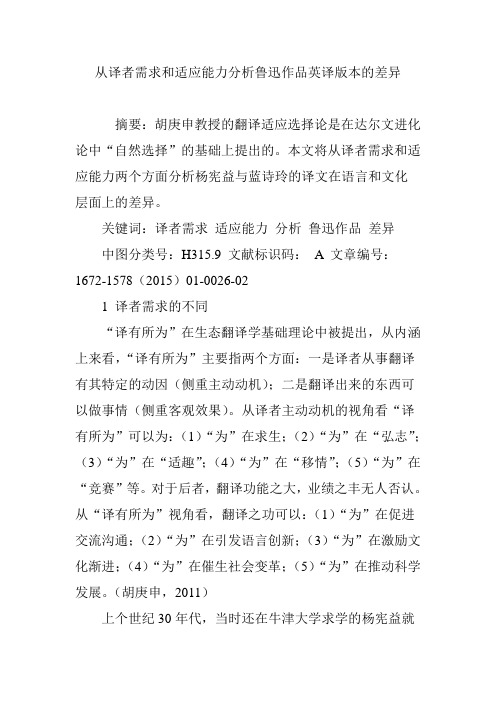
从译者需求和适应能力分析鲁迅作品英译版本的差异摘要:胡庚申教授的翻译适应选择论是在达尔文进化论中“自然选择”的基础上提出的。
本文将从译者需求和适应能力两个方面分析杨宪益与蓝诗玲的译文在语言和文化层面上的差异。
关键词:译者需求适应能力分析鲁迅作品差异中图分类号:H315.9 文献标识码: A 文章编号:1672-1578(2015)01-0026-021 译者需求的不同“译有所为”在生态翻译学基础理论中被提出,从内涵上来看,“译有所为”主要指两个方面:一是译者从事翻译有其特定的动因(侧重主动动机);二是翻译出来的东西可以做事情(侧重客观效果)。
从译者主动动机的视角看“译有所为”可以为:(1)“为”在求生;(2)“为”在“弘志”;(3)“为”在“适趣”;(4)“为”在“移情”;(5)“为”在“竞赛”等。
对于后者,翻译功能之大,业绩之丰无人否认。
从“译有所为”视角看,翻译之功可以:(1)“为”在促进交流沟通;(2)“为”在引发语言创新;(3)“为”在激励文化渐进;(4)“为”在催生社会变革;(5)“为”在推动科学发展。
(胡庚申,2011)上个世纪30年代,当时还在牛津大学求学的杨宪益就开始从事翻译工作。
在上世纪初,他就亲眼见证了中国人民为了推翻帝国主义,封建主义而获得独立所付出的各种努力。
在这样的情形下,作为一名在海外求学的爱国青年,他决定反其道而行之,将中国的文学著作翻译成英文,激发西方人的兴趣去了解这个5000年文明的古国特有的文化和传统。
由此看来,我们可将杨宪益的“译有所求”归结为“为”在“移情”。
因此在他译本中,他特别注重中国特有文化和文化形象的翻译,为了保证原著的原汁原味,他在翻译这些词汇和表达的时候尽量直译,有时也会加上一些脚注来解释。
例如:这把戏一个人玩起来,必须在金龙之前,摆一个金鼎,注满清水,用兽碳煎熬。
(《铸剑》)V1:It must be in the presence of a golden dragon,and I must have a golden cauldron…(Yang,1972)V2:But the performance requires more than its conjuror:it needs a golden cauldron filled with water,heated with charcoal and set before a king. (Julia Lovell,2009)在上述例子中,中国人经常会将皇帝比作是金龙,但是在西方人图示里,这两种东西毫无联系。
法律文本翻译第五章 法律文本翻译的原则

翻译原则是指翻译活动必须遵循的准绳,它 是翻译实践的准绳,是衡量翻译工作效果的标尺。 法律翻译是语言的转换也是法律文化的转换。虽 然各种文体的翻译都始终不能脱离“忠实”和 “通顺”的标准,但各种文体的翻译也都有各自 的侧重点。法律文本属于权威性言论,其主导功 能是表达原作者的意愿。法律文本的特点是语言 的确凿性和语言风格的独特性。因此在翻译法律 文本时,应尊重原作者的权威,将原作者的意愿 表达得清楚、确凿,不能产生任何歧义,而且还 要保证译文的语言风格与原文相一致。
example
– The parties hereto shall,first of all, settle any dispute arising from or in connection with the contract by friendly negotiations. Should such negotiations fail,such dispute may be referred to the People’s Court have jurisdiction on such dispute for settlement in the absence of any arbitration clause in the disputed contract or in default of agreement reached after such dispute occurs.
✓ 第一,努力创造出既符合原文语义又体现原文文化特色的译作。 ✓ 第二,如果意义和文化不能同时兼顾,译者只有舍弃形式对等,
通过在译文中改变原文的形式达到再现原文语义和文化的目的。 ✓ 第三,如果形式的改变仍然不足以表达原文的语义和文化,可
以采用“重创”这一翻译技巧来解决文化差异,使源语和目的 语达到意义上的对等。
法律翻译技巧
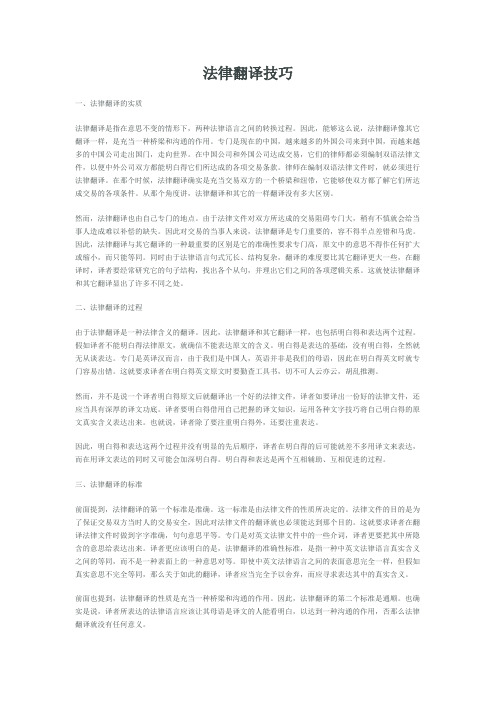
法律翻译技巧一、法律翻译的实质法律翻译是指在意思不变的情形下,两种法律语言之间的转换过程。
因此,能够这么说,法律翻译像其它翻译一样,是充当一种桥梁和沟通的作用。
专门是现在的中国,越来越多的外国公司来到中国,而越来越多的中国公司走出国门,走向世界。
在中国公司和外国公司达成交易,它们的律师都必须编制双语法律文件,以便中外公司双方都能明白得它们所达成的各项交易条款。
律师在编制双语法律文件时,就必须进行法律翻译。
在那个时候,法律翻译确实是充当交易双方的一个桥梁和纽带,它能够使双方都了解它们所达成交易的各项条件。
从那个角度讲,法律翻译和其它的一样翻译没有多大区别。
然而,法律翻译也由自己专门的地点。
由于法律文件对双方所达成的交易阻碍专门大,稍有不慎就会给当事人造成难以补偿的缺失。
因此对交易的当事人来说,法律翻译是专门重要的,容不得半点差错和马虎。
因此,法律翻译与其它翻译的一种最重要的区别是它的准确性要求专门高,原文中的意思不得作任何扩大或缩小,而只能等同。
同时由于法律语言句式冗长、结构复杂,翻译的难度要比其它翻译更大一些,在翻译时,译者要经常研究它的句子结构,找出各个从句,并理出它们之间的各项逻辑关系。
这就使法律翻译和其它翻译显出了许多不同之处。
二、法律翻译的过程由于法律翻译是一种法律含义的翻译。
因此,法律翻译和其它翻译一样,也包括明白得和表达两个过程。
假如译者不能明白得法律原文,就确信不能表达原文的含义。
明白得是表达的基础,没有明白得,全然就无从谈表达。
专门是英译汉而言,由于我们是中国人,英语并非是我们的母语,因此在明白得英文时就专门容易出错。
这就要求译者在明白得英文原文时要勤查工具书,切不可人云亦云,胡乱推测。
然而,并不是说一个译者明白得原文后就翻译出一个好的法律文件,译者如要译出一份好的法律文件,还应当具有深厚的译文功底。
译者要明白得借用自己把握的译文知识,运用各种文字技巧将自己明白得的原文真实含义表达出来。
法律文本翻译讲义

Syntax of law
1. complex sentences otherwise… subject to… without prejudice to… provided that… notwithstanding… where clause who clause 2. passive voice
Thanks!
法律文本的翻译 Translation of Legal Document
It is not possible to gain an insight into the nature of any institution of human life without an inquiry into the purposes or functions which the particular institution is designed to accomplish. Nobody can intelligently discuss problems of government and arrive at a considered judgment with respect to the policies which should be promoted by public officials or agencies without first forming an opinion as to the general aims and ends for which governments are established. This is equally true for the institution of law, at least in the secular, political sense with which we are concerned. We treat law as a particular kind of governmental institution. From this perspective, we assert that no official within the institution of law—no judge, attorney or other person with official duties in the administration of law—can adequately discharge his or her duties unless familiar with the general purposes which the law is supposed to perform for society.
法律文件翻译

法律文件翻译
法律文件翻译:在我国,法律文件翻译是一个具有重要意义的任务。
它不仅涉及到法律的正确理解和诠释,还关系到国际交流和合作中的法律事宜。
因此,法律文件的翻译必须非常准确、严谨和专业。
首先,法律文件的翻译需要准确无误。
由于法律的特殊性,对词语的理解必须十分准确。
在翻译过程中,必须对每一个词语进行深入的研究和理解,避免意思模糊或错误的情况发生。
例如,在涉及合同法的翻译中,合同中的每个条款和条文都需要被准确地翻译,以确保双方的权益。
其次,法律文件的翻译需要语言严谨。
法律文件通常是由律师或法律专业人士撰写的,因此使用的语言非常严谨和专业。
在翻译过程中,译员必须完全理解原文的语法结构、表达方式和用词习惯,并确保翻译的文本与原文一致,以尽量保持其严谨性。
此外,法律文件的翻译需要专业精通领域知识。
不同领域的法律文件涉及到不同的专业知识,因此译员在翻译之前必须对相关领域有一定的了解和掌握。
比如,在翻译商业合同时,译员应该熟悉相关的商法知识,以确保准确地理解和翻译其中的条款和约定。
最后,法律文件的翻译需要文化差异的考虑。
由于每个国家或地区的法律体系和惯例各有不同,翻译人员必须对于本国和目标语言国家的法律文化有一定的了解。
在翻译的过程中,必须
根据目标语言的文化和法律体系,选择适当的表达方式和用词,以确保翻译的文本在文化上的准确性和适应性。
总之,法律文件的翻译是一项极其重要的任务,要求译员具备准确无误、语言严谨、专业精通领域知识以及考虑文化差异等能力。
只有在这些要求下,才能保证法律文件的翻译质量,促进国际交流与合作的顺利进行。
